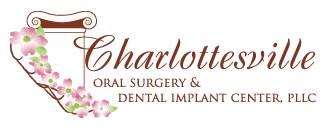09 Sep Symptoms and treatment of oral cancer
One of the most difficult aspects of oral cancer is the lack of noticeable signs and symptoms. One of the best aspects of dentistry in Charlottesville is that you can trust your dental professionals to provide routine screening and education regarding oral cancer.
The early signs of oral cancer occur at the cellular level. As the cells in the various layers of skin begin to change, the soft tissue of the head, neck, and mouth may begin to thicken or stiffen. On the surface, whitish, reddish, or dark discolorations may appear. Often, these changes do not produce the typical “red flags” associated with most medical problems. You may not be able to recognize significant pain, swelling, or bleeding.
To add another difficult dimension to the disease, oral cancer is often extremely difficult to detect during self-examination. Early detection is one of the best ways to increase your chances of a favorable outcome. Locations such as the hard palate, soft palate, sides of the tongue, and insides of the lips can be hard to evaluate at home. Unfortunately, by the time most patients can identify an oral cancer lesion at home, the disease may have progressed to an untreatable phase.
Through clinical, visual, and palpable (touching) examinations, your oral surgeon can begin screening patients for oral cancer. There are certain lifestyle risk factors that may increase your chances of being diagnosed with oral cancer. These factors include a previous history of cancer, a history of the HPV virus, chronic smoking, and chronic alcohol use. Still, guidelines in dentistry dictate that all patients be screened for oral cancer, since approximately 25% of oral cancer patients display no lifestyle risk factors at all.
Once your oral surgeon has identified a suspicious lesion or abnormality in the head, neck, or mouth, various tests can be performed to confirm the diagnosis. A biopsy can be utilized to determine the type and extent of the abnormality. With these findings, oral surgery may be indicated to remove the lesion.
Similar to other forms of cancer, early detection can mean an early and complete recovery. Call the office of Dr. Carlos Rafael Ibañez at 434-295-0911 to schedule your appointment for oral cancer screening and to discuss your risk factors.
